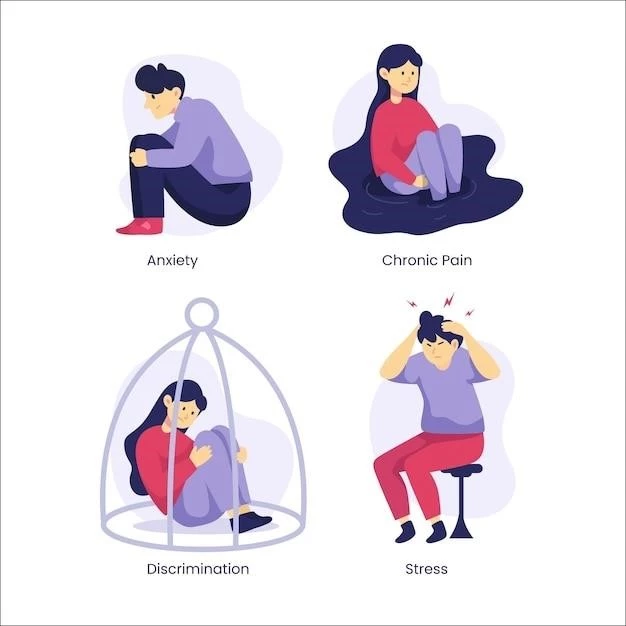Understanding Depressive Personality Disorder
Depressive Personality Disorder is a complex condition that can significantly impact daily life․ This article provides insights into the characteristics, symptoms, causes, and coping strategies associated with this disorder․ Understanding these aspects is crucial for individuals grappling with this challenging mental health issue․

Overview of Depressive Personality Disorder
Depressive Personality Disorder is characterized by a pervasive pattern of chronic sadness, pessimism, hopelessness, and emotional instability․ Individuals with this disorder often exhibit cognitive distortions, negative self-image, and social withdrawal․ It is essential to recognize that depressive traits are different from a temporary state of sadness․ People with Depressive Personality Disorder may struggle with maintaining relationships, achieving goals, and overall life satisfaction․ Understanding the symptoms and manifestations of this disorder is crucial in seeking appropriate diagnosis and treatment․ If you or someone you know shows signs of Depressive Personality Disorder, it is essential to seek professional help for proper management and support․
Symptoms and Manifestations
Depressive Personality Disorder is associated with a range of symptoms and manifestations that affect various aspects of an individual’s life․ These may include chronic sadness, cognitive distortions, emotional instability, negative self-image, social withdrawal, pessimism, and feelings of hopelessness․ Individuals with this disorder may struggle with forming and maintaining relationships, experience difficulties at work or school, and have challenges in daily functioning․ It is crucial to recognize these symptoms early on and seek professional help․ If you or someone you know is exhibiting these signs, do not hesitate to reach out to a mental health professional for evaluation and support․
Causes and Risk Factors
The causes and risk factors of Depressive Personality Disorder are multifaceted and may involve a combination of genetic, biological, environmental, and psychological factors․ Genetic predisposition, early life experiences, trauma, dysfunctional family dynamics, and certain personality traits can contribute to the development of this disorder․ Additionally, chronic stress, substance abuse, and other mental health conditions can increase the risk of experiencing Depressive Personality Disorder․ Understanding the underlying causes and risk factors is essential for effective treatment and management of the disorder․ If you suspect that you or someone you care about may be at risk, it is important to seek professional help to address these factors and develop a comprehensive treatment plan․
Diagnosis and Treatment
Diagnosing Depressive Personality Disorder involves a comprehensive evaluation by a mental health professional․ The assessment may include a review of symptoms, medical history, and psychological assessments․ Treatment typically involves psychotherapy, such as cognitive-behavioral therapy or dialectical behavior therapy, to address negative thought patterns and improve coping strategies․ Medication may also be prescribed to manage symptoms such as anxiety or depression․ It is crucial to adhere to the treatment plan provided by healthcare providers and attend regular therapy sessions․ Self-care practices, such as maintaining a healthy lifestyle, engaging in physical activity, and practicing relaxation techniques, can also complement treatment efforts․ If you suspect you have Depressive Personality Disorder, do not hesitate to seek help and follow through with the recommended treatment options for a better quality of life․
Coping Strategies and Self-Help Techniques
Coping with Depressive Personality Disorder involves developing effective strategies to manage symptoms and improve mental well-being․ Engaging in regular physical exercise, maintaining a healthy diet, and getting an adequate amount of sleep can positively impact mood and overall mental health․ Practicing mindfulness and relaxation techniques, such as meditation or deep breathing exercises, can help reduce stress and promote emotional stability․ Building a strong support system consisting of friends, family, or support groups can provide valuable emotional support during challenging times․ It is essential to prioritize self-care activities, engage in hobbies, and set realistic goals to enhance self-esteem and combat negative self-image․ Remember, seeking professional help and incorporating these self-help techniques into daily life can significantly contribute to overcoming the challenges associated with Depressive Personality Disorder․
Lifestyle Changes and Long-Term Outlook
Making positive lifestyle changes can have a significant impact on managing Depressive Personality Disorder in the long run․ Incorporating regular exercise, a balanced diet, and sufficient sleep into your routine can boost overall well-being and resilience․ Avoiding alcohol, drugs, and other substances that can worsen symptoms is essential․ Engaging in activities that provide a sense of purpose and fulfillment can enhance mood and quality of life․ While managing Depressive Personality Disorder may require ongoing effort, with dedication to treatment, self-care, and healthy habits, individuals can experience improvements in symptoms and a better long-term outlook․ Remember, seeking professional guidance, staying consistent with treatment plans, and fostering a positive mindset are key elements in managing this disorder effectively․
